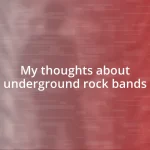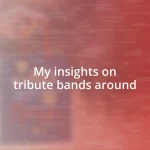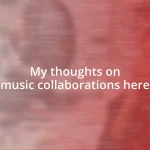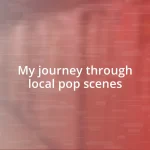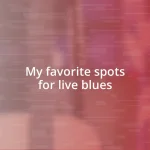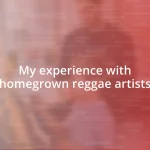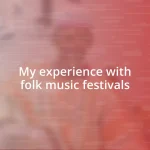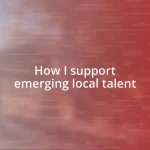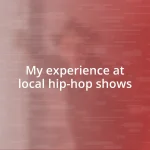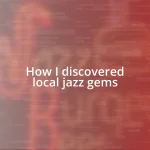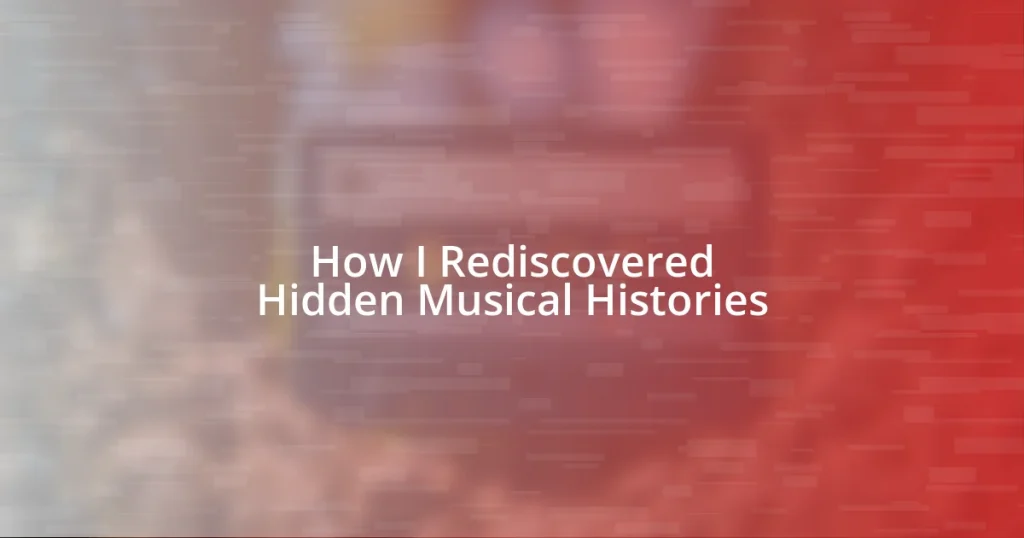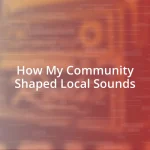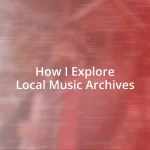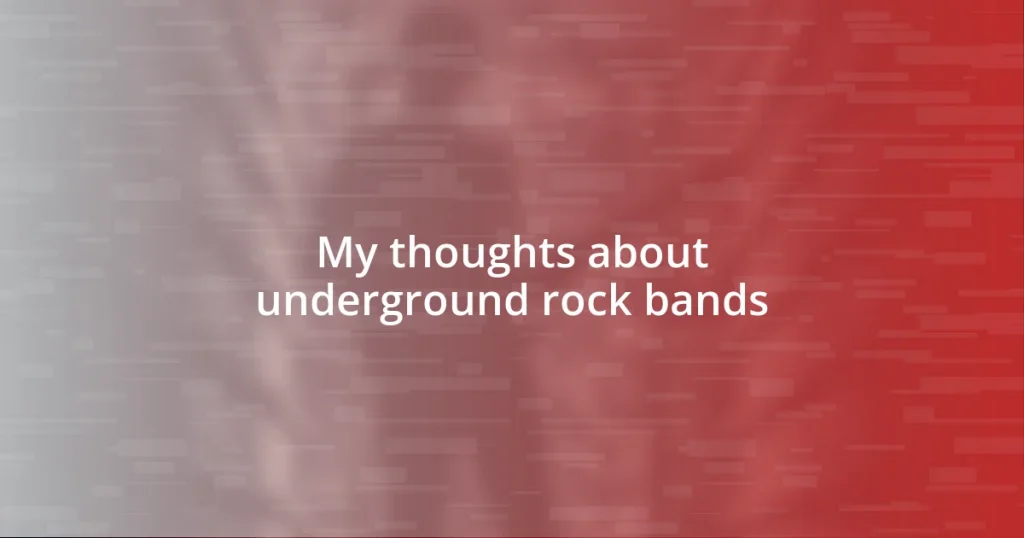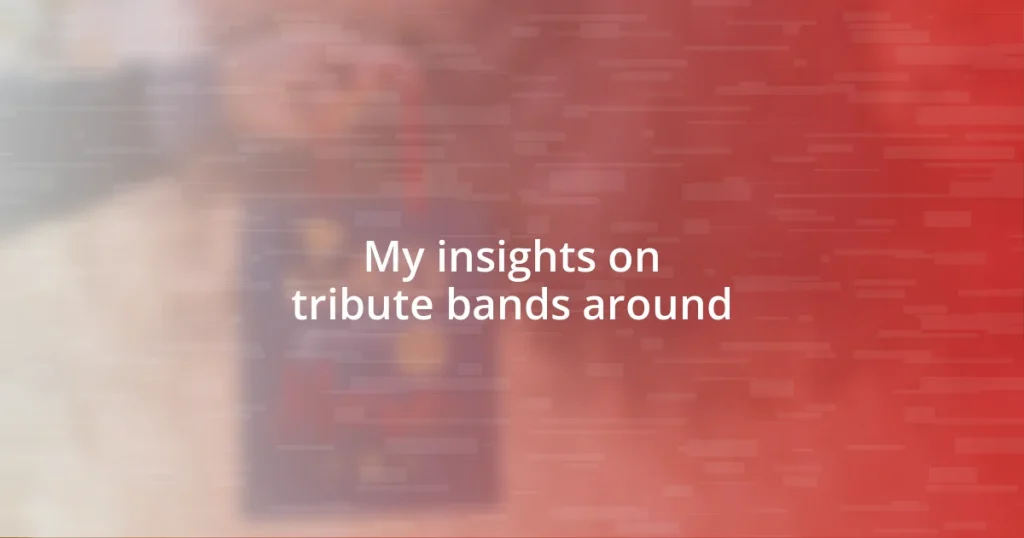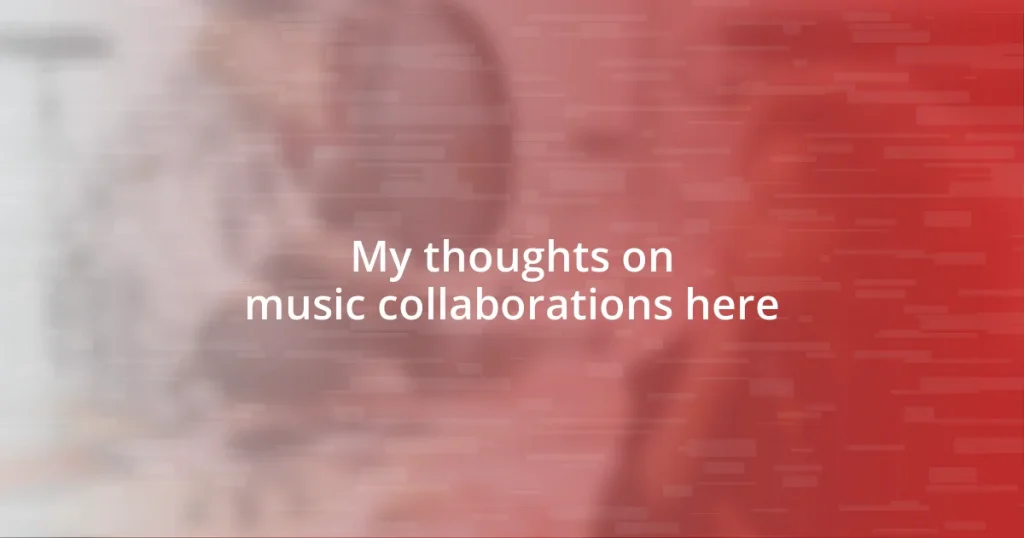Key takeaways:
- Hidden musical histories reveal valuable cultural narratives and foster intergenerational connections, enhancing appreciation for music beyond mere enjoyment.
- Rediscovering music through various techniques enriches personal experiences and strengthens community bonds by connecting different eras and generations.
- Documenting and sharing musical findings promotes engagement and dialogue, transforming music into a collective experience that unites people through shared stories and emotions.
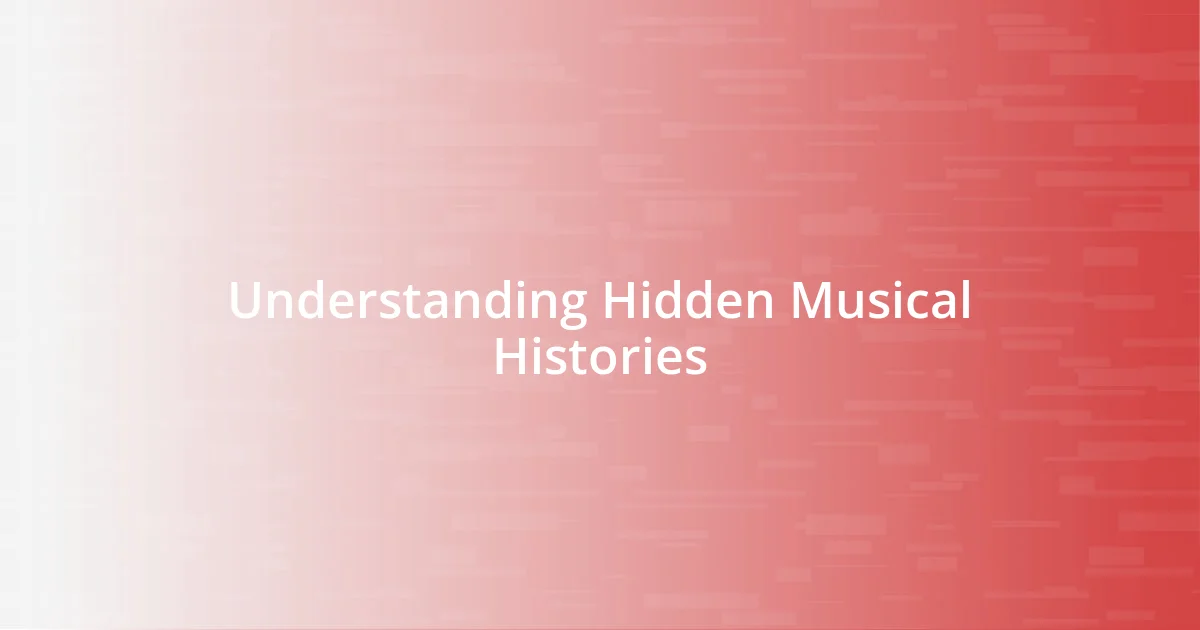
Understanding Hidden Musical Histories
Hidden musical histories are like precious gems waiting to be discovered. I can’t tell you how exhilarating it was to stumble upon a forgotten record by an obscure artist while sifting through crates at a local thrift store. That moment sparked my curiosity—how many incredible stories are tucked away, just waiting for someone to unearth them?
As I delved deeper into these histories, I began to realize that music is not just about notes and rhythms; it’s a living narrative reflecting cultural movements, struggles, and triumphs. Each song often carries the weight of personal experience and collective memory. Have you ever considered how your favorite tracks might connect to broader historical contexts? Learning about the influences and events that shaped these hidden gems gave me a profound appreciation for their significance.
I vividly remember the moment I uncovered the roots of a traditional folk song that had been passed down through generations in my family. Listening to it with my grandmother, I felt a wave of connection and nostalgia wash over us. This experience highlighted how especially powerful hidden musical histories can be in fostering intergenerational ties and understanding our cultural legacies. It left me wondering: what other stories lie behind the songs that accompany our everyday lives?
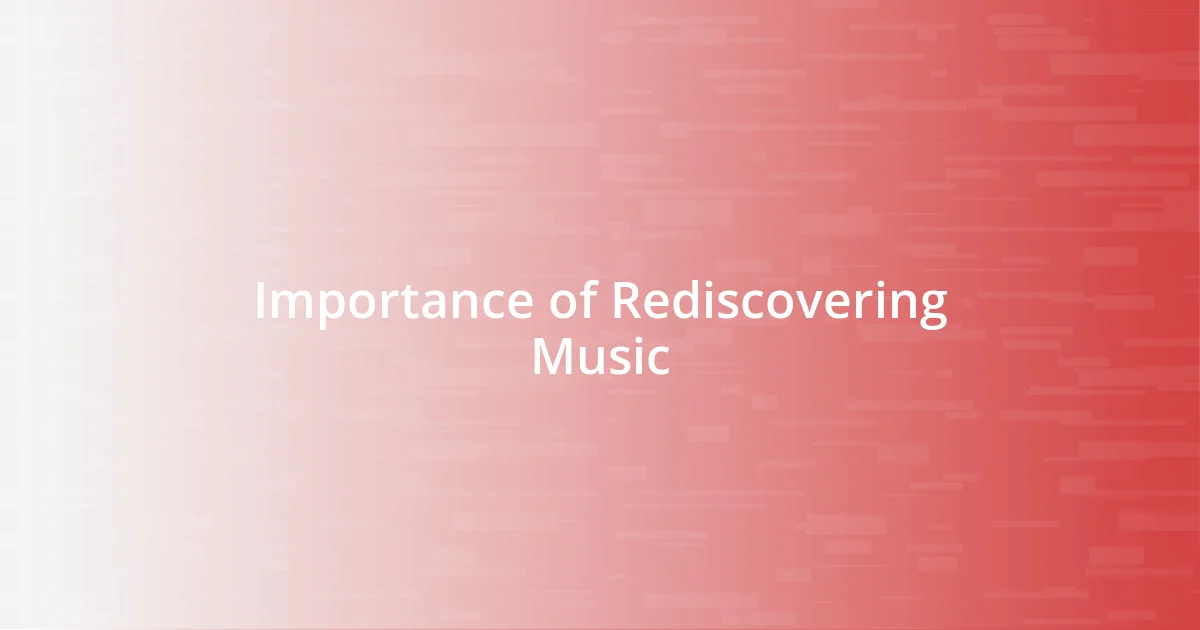
Importance of Rediscovering Music
Rediscovering music holds profound significance, as it enriches our understanding of diverse cultural narratives. I recall a time when I heard a long-lost song from my childhood; it transported me back to my family gatherings filled with laughter and dance. Each rediscovery can awaken memories and emotions, reminding us of shared histories and personal experiences that shape who we are.
Music often serves as a bridge connecting generations, offering insights into the past and the evolution of cultural expressions. I remember attending a local music festival and hearing a contemporary artist perform a reimagined version of a traditional tune. It made me reflect on how music is a living, breathing entity, continually morphing while still being rooted in history. This play between the old and the new creates a tapestry of sound that can inspire, educate, and bring us together.
The importance of rediscovering music extends beyond personal enjoyment; it fosters a sense of community and identity. During a recent community event, I watched children and grandparents alike engage with songs from various eras, each finding joy in the shared experience. It struck me how music can transcend time—reawakening stories that resonate within us all, giving us a sense of belonging and understanding in an increasingly fragmented world.
| Aspect | Rediscovering Music |
|---|---|
| Emotional Connection | Aids in recalling memories and feelings. |
| Cultural Insight | Reveals historical context and societal changes. |
| Intergenerational Bonding | Fosters relationships across age groups through shared experiences. |
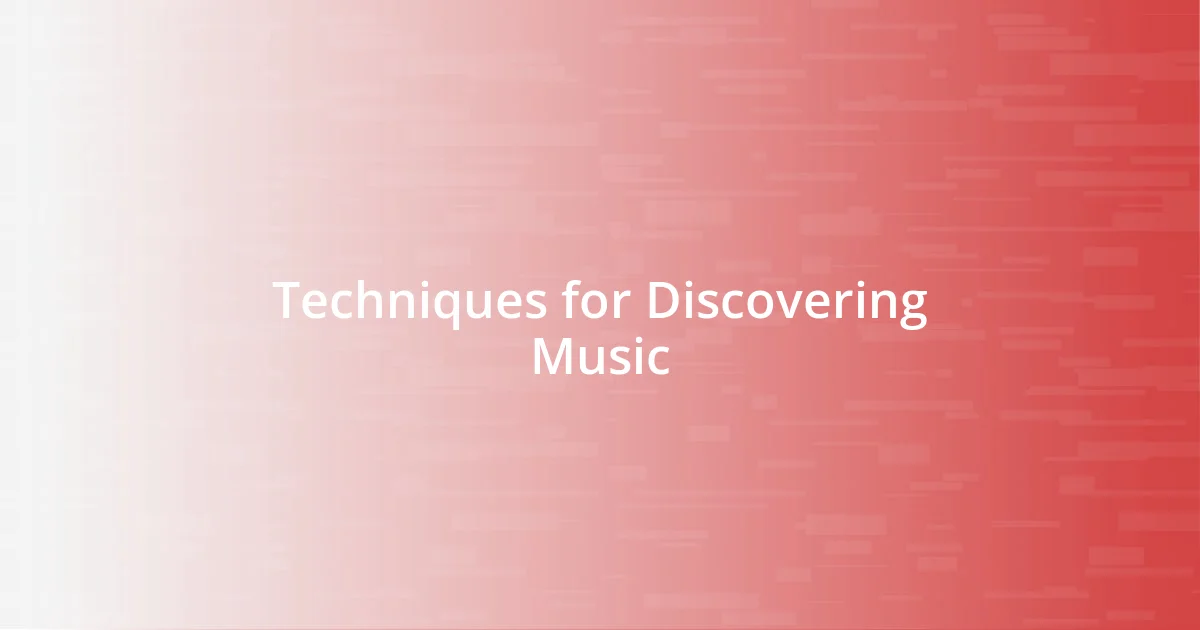
Techniques for Discovering Music
In my quest to uncover hidden musical treasures, I’ve adopted various techniques that truly enhance the discovery experience. One of my favorites is exploring online archives and platforms known for niche or rare recordings. Just the other afternoon, I stumbled across an obscure label’s website featuring a collection of early 20th-century blues recordings—each track oozing with authenticity and stories of the past. It felt like unearthing a time capsule, each song breathing life into long-forgotten tales.
Here are a few techniques that have worked wonders for me:
- Thrift Stores and Flea Markets: I’ve found some of my most cherished vinyl here—don’t underestimate the magic of rummaging!
- Online Music Databases: Websites like Discogs can be goldmines for tracking down rare albums and understanding their backstories.
- Community Events and Local Festivals: Engaging with local musicians can reveal vibrant narratives about your region’s musical history that you might never have encountered otherwise.
- Social Media Groups and Forums: Sharing discoveries in niche communities can lead to recommendations and dialogues that deepen your understanding.
When it comes to digging deeper, listening actively becomes key. I’ve learned that tuning into the nuances of a track—like production styles or lyrical content—often reveals connections to sociopolitical movements or cultural shifts. For example, I was once captivated by a protest song that, despite its age, echoed the sentiments of today’s struggles. This realization made me reflect on how music often cycles through time, continuously reflecting the battles we face as a society.
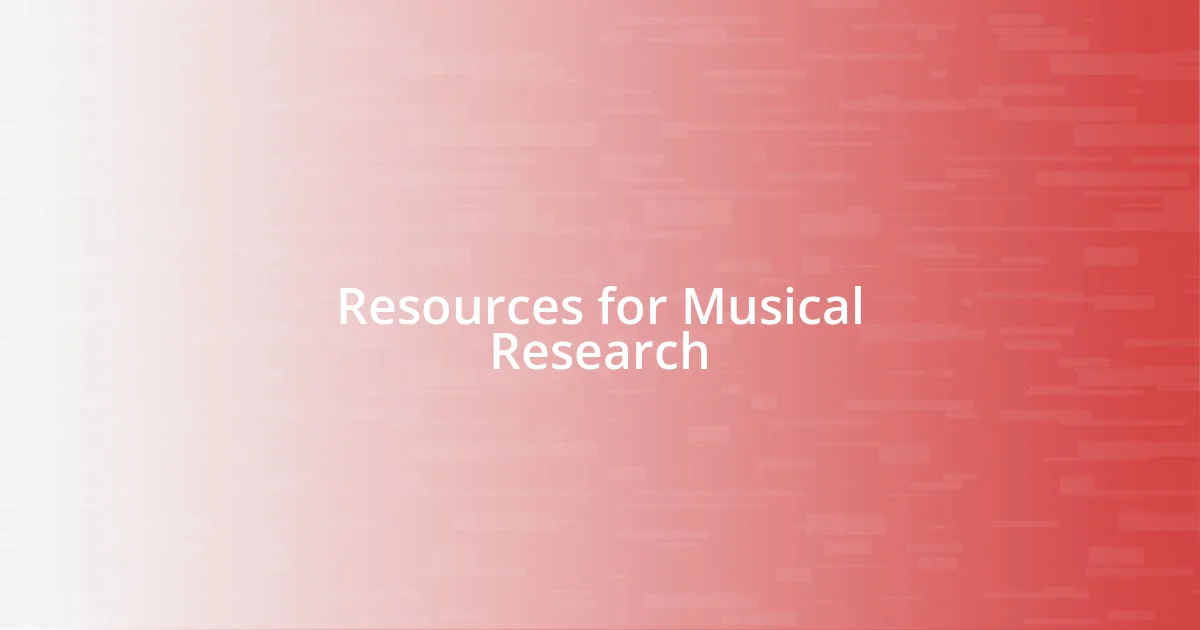
Resources for Musical Research
Resources for musical research are abundant, and I’ve discovered that utilizing a mix of traditional and modern tools can yield remarkable results. Libraries are often overlooked gems; I recall spending hours rifling through dusty archives, unearthing old music journals and magazines. Each page turned felt like peeling back layers of history, revealing insights into artists and songs I had never previously encountered.
Digital resources have undeniably transformed my research experience. Platforms like YouTube and SoundCloud host vast collections of music, where I’ve often stumbled upon rare live performances and recordings. I remember the thrill of discovering a recording of an underground artist from the 1980s—that moment of connection with a musician from a different era was electrifying and deepened my appreciation for the journey of music across time.
Furthermore, engaging with passionate communities on forums and social media can make a world of difference. When I participated in a discussion about a forgotten jazz artist, not only did I learn more about the artist’s work, but I also connected with others who shared my curiosity. Hasn’t it been fascinating to see how an online discussion can lead to connections you wouldn’t have made otherwise? These exchanges foster a collaborative spirit in which we all contribute pieces of a larger musical puzzle, enriching our own understanding and appreciation of hidden musical histories.
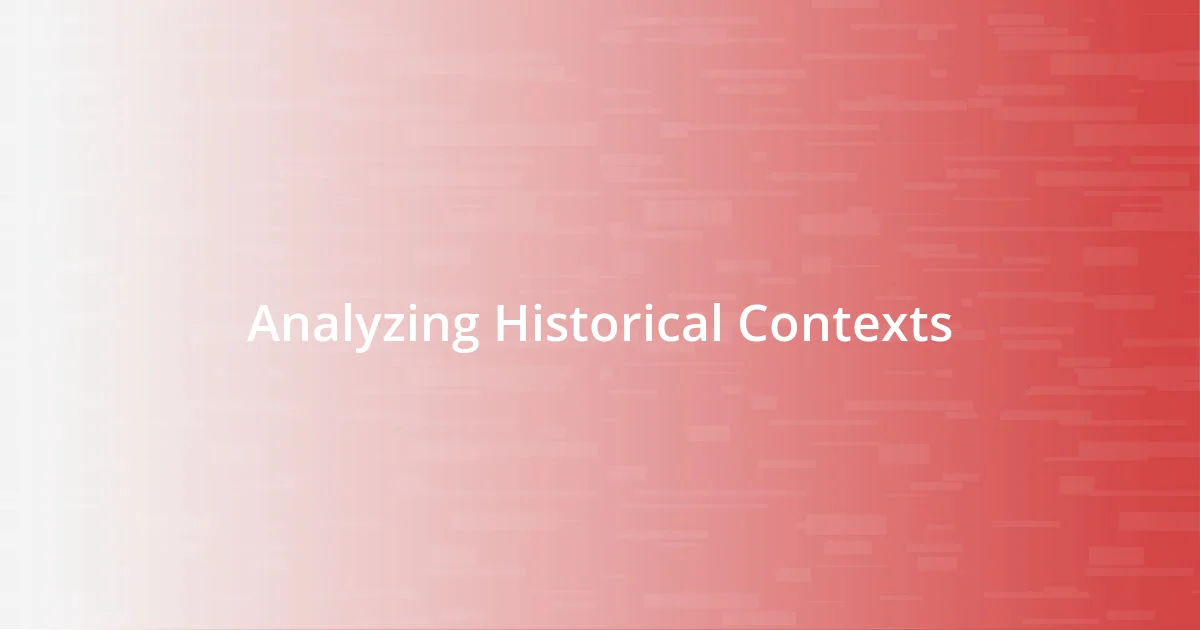
Analyzing Historical Contexts
Understanding the historical context of music is like piecing together a fascinating jigsaw puzzle. I remember delving into the origins of folk music and feeling a strong connection when I learned how these melodies were woven into the fabric of daily life for past communities. For instance, I discovered a song that originated during the Great Depression, filled with heartache but also resilience. It struck a chord with me—how often do we find echoes of our own struggles in these historical tunes?
As I explored various genres, I realized how closely music is tied to social movements and cultural shifts. One afternoon, while researching punk music’s rise in the 1970s, I couldn’t help but feel the raw energy that artists infused into their work as a reaction to societal issues at the time. Each chord and lyric shared a message, calling for change and expressing defiance—a sentiment that remains relevant today. Have you ever listened to a song and thought about what was happening in the world when it was written?
Through my explorations, I’ve come to appreciate the role of music as both a historical document and an emotional outlet. One of my most memorable discoveries was an album released during the civil rights movement; each track encapsulated the hopes and struggles of a generation. Listening felt like stepping into a time machine, connecting me not just to the past but also igniting a passion in me to share these stories. It reinforced my belief that through music, we can better understand the complexities of human experience across time and cultures.

Documenting Your Findings
Documenting your findings can be an incredibly rewarding process, and I’ve found that keeping a dedicated journal or digital file is essential. I often jot down not just the facts but my reactions—like the time I stumbled upon a local band’s demo tape from the ’70s that revealed a vibrant subculture I had no idea existed. Writing about how the music made me feel or the memories it triggered enriches my research and keeps my passion for music alive.
Visuals are just as important in documenting your discoveries. I’ve created collages of images, concert posters, and album covers that accompany my notes. This practice not only makes my documentation more engaging but also creates a richer context for the music I explore. Can you imagine flipping through a scrapbook filled with snapshots of artists and scenes that tell a story? It transforms data into a narrative that resonates on a personal level.
Lastly, I encourage using audio-visual elements—like recording your own reflections or compiling playlists of the music you uncover. For example, one evening, I recorded a podcast episode where I shared my favorite finds from the ’90s grunge scene. It felt liberating, and I noticed that it also helped clarify my thoughts. Have you ever considered how documenting your findings in varied formats could deepen not just your understanding but also your connection to the music?
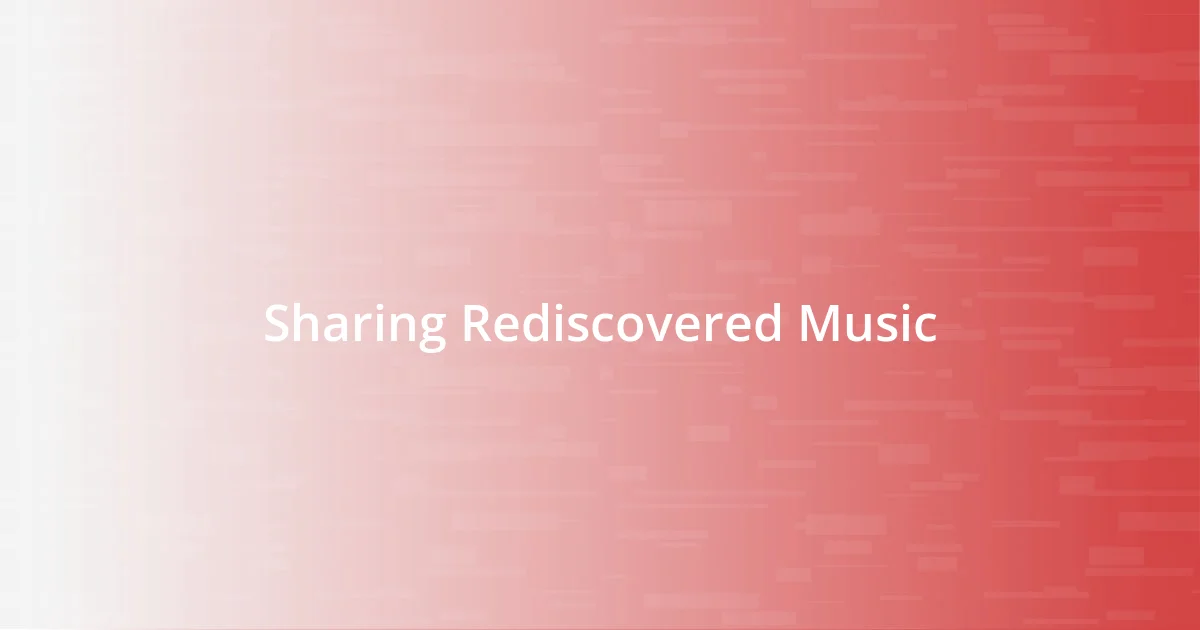
Sharing Rediscovered Music
Sharing my rediscovered music often feels like opening a treasure chest of emotions and stories, just waiting to be explored. Recently, I shared an obscure track from the ’60s that spoke volumes about the struggles of the time. When I played it for friends, their reactions were priceless. It was thrilling to witness them connect with the music, feeling the weight of the past in the rhythms and lyrics, reminding me of how powerful sharing can be in bridging gaps across generations.
The act of sharing isn’t just about the music itself; it’s about the dialogues that emerge around it. I remember hosting a small gathering where I shared my findings on a forgotten blues artist whose life was as riveting as any novel. As we discussed his influence on modern musicians, I could see the spark in my friends’ eyes—a blend of curiosity and newfound appreciation. Have you ever noticed how a single song can ignite profound conversations that draw us closer to one another? It’s moments like these that affirm music’s role as a connector.
Additionally, leveraging social media has transformed the way I share rediscovered tunes. I’ll often post snippets of songs alongside interesting anecdotes or historical context, which invites engagement from my audience. One time, I shared an old protest song that led to a flood of comments, where people reminisced about similar experiences in more recent movements. This interaction not only made the music feel alive but also showcased how interconnected we all are, even through the lens of memories and melodies. Isn’t it remarkable how sharing music can create a community united by collective experiences?
